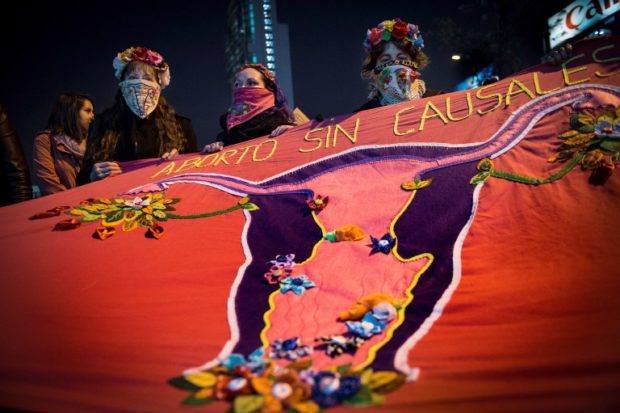Chile Congress lifts abortion ban

Activists holding placards supporting abortion take part in a pro-abortion demonstration in Santiago, on July 25, 2017. AFP FILE PHOTO
Chile’s Congress on Wednesday eased a strict ban on abortion in effect since the final days of the Augusto Pinochet dictatorship nearly three decades ago.
The measure, which passed with a 22-13 vote, allows abortion in cases of rape, if the mother’s life is at risk or if the fetus presents a deadly birth defect.
It now awaits a ruling by the Constitutional Court at the request of the opposition.
Until now, the South American country has been part of a small group of socially conservative nations that barred abortion under all circumstances — including the Dominican Republic, El Salvador, Gabon, Haiti, Malta, Nicaragua, the Philippines and Senegal.
“We are satisfied. We have delivered alternatives, and safe health care options, to all women, regardless of the decisions they make,” said Claudia Pascual, minister for women and gender equality.
In this deeply conservative country, the measure has been a priority for leftist President Michelle Bachelet, Chile’s first woman president and a pediatrician by training.
Bachelet has worked since 2015 to overturn the strict ban on abortions put in place in 1989, in the final days of the Pinochet dictatorship.
Under current law, abortion is punishable by up to five years in prison.
Until the Pinochet-era change, abortion already was legal in Chile for five decades — in case of danger to the mother’s life or an unviable fetus.
Bachelet, after serving a first term as president, became the first chief of UN Women — the United Nations Entity for Gender Equality and the Empowerment of Women.
She pledged to see the easing of the ban enacted before she leaves office in March 2018.
Conservative groups have historically had great influence in Chile, though they have lost ground in recent years. Chileans had to wait until 2004 to be able to divorce, and until just two years ago to enter into same-sex civil unions.